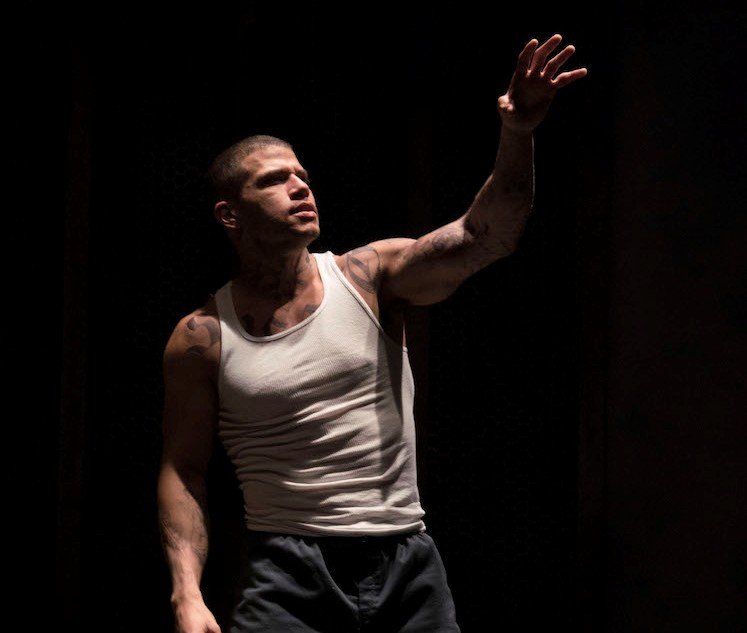Culture & Media
The Bitter Stage of “Time Alone”
A new drama speaks not only to issues of criminal justice, but to the inner turmoil many of us wrestle with every day.

Tonya Pinkins in Time Alone. (Photo: David Morrison)
This powerful drama by Alessandro Camon delves into the minds of two extraordinarily isolated people: a convict serving a life sentence for a murder he committed as a juvenile, and the mother of a police officer whose only son was shot and killed in the line of duty. The play, which premiered last weekend at Los Angeles Theater Center under Bart DeLorenzo’s direction, is made up of a series of monologues delivered by two characters who never meet until the play’s final moment. Incisively written and artfully mounted, the production nevertheless falls short of its explosive potential; it needs more probing work from the actors before that can be achieved. Let’s hope that happens.
Designer Francois Pierre Couture’s uncluttered, bifurcated set reflects the barrenness in each of the characters’ lives. On one side is a small cell in the isolation ward of a California prison. It’s occupied by Gabriel (Alex Hernandez), a man in his 30s serving 50 years to life. Gabriel’s story is a familiar one: He wasn’t a bad kid but there were no stable adults around to guide him, and when a casual girlfriend was shot, the ethos of the streets demanded that he retaliate. In prison, he gets into more trouble after somebody steals his things, and he strikes back. He subsequently becomes entangled in a vicious payback cycle that provokes prison authorities to punish him, and propels him to the isolation ward, where he’s now spent many years of his sentence.
On the other side of the stage sits Anna (Tonya Pinkins), in a kitchen bare of warmth or personality, recollecting on 14 years of a happy marriage that ended when her husband, a police officer, passed away. Their son, her pride and joy, followed in his father’s footsteps — then died tragically in a shootout while trying to apprehend a suspect. The trauma has left Anna consumed with grief and rage. Since then sympathetic friends, including a lover, have fallen away, leaving her profoundly isolated and nursing a bitterness that’s grown exponentially as time’s gone on.
Time Alone is not an easy play to do. The text is dense and the characters do not interact until the end, nor do we perceive any connection between them other than each representing a point of view from opposite sides of the justice system. What does connect Gabriel and Anna is the extremity of their loneliness, and the depth and detail with which Camon shapes their stories is profoundly compelling. Each character is taken up not only with the events in their lives but with their larger implications. Gabriel especially ruminates on the nature of time, which for him does not exist as it does for rest of us. Its featureless passage is disturbing to mind and body, prompting acts of self-injury to insure himself that he’s alive.
The performances, as I’ve said, need finessing. Hernandez is more on track in the role; both he and Pinkins are on top of the text and have all their external moves down. But that magic melding of a performer with his or her character’s inner self has not yet transpired for either. Nevertheless, this is a top-of-the-line drama, which speaks not only to issues of criminal justice but to the inner turmoil many of us wrestle with every day.
Belle Reve Theatre Company at LATC, 514 S. Spring St., downtown Los Angeles; Thurs.-Sat., 8 p.m.; Mon., Oct. 16 & 23, 7:30 p.m.; Sun., Oct. 16 & 29, 3 p.m.; Sun., Oct. 22, 5 p.m. (213) 489-0994 or www.bellerevetheatre.com or www.thelatc.org.

-

 The SlickJanuary 23, 2026
The SlickJanuary 23, 2026Yes, the Energy Transition Is Coming. But ‘Probably Not’ in Our Lifetime.
-

 The SlickJanuary 27, 2026
The SlickJanuary 27, 2026The One Big Beautiful Prediction: The Energy Transition Is Still Alive
-

 Column - State of InequalityJanuary 29, 2026
Column - State of InequalityJanuary 29, 2026Are California’s Billionaires Crying Wolf?
-

 Latest NewsFebruary 3, 2026
Latest NewsFebruary 3, 2026Amid the Violent Minnesota Raids, ICE Arrests Over 100 Refugees, Ships Many to Texas
-

 Dirty MoneyJanuary 30, 2026
Dirty MoneyJanuary 30, 2026Amid Climate Crisis, Insurers’ Increased Use of AI Raises Concern For Policyholders
-

 Featured VideoFebruary 4, 2026
Featured VideoFebruary 4, 2026Protesters Turn to Economic Disruption to Fight ICE
-

 The SlickFebruary 2, 2026
The SlickFebruary 2, 2026Colorado May Ask Big Oil to Leave Millions of Dollars in the Ground
-

 Column - State of InequalityFebruary 5, 2026
Column - State of InequalityFebruary 5, 2026Lawsuits Push Back on Trump’s Attack on Child Care

